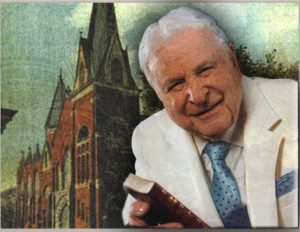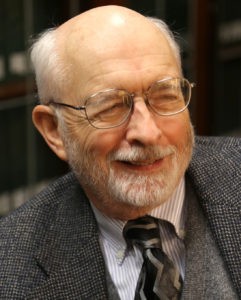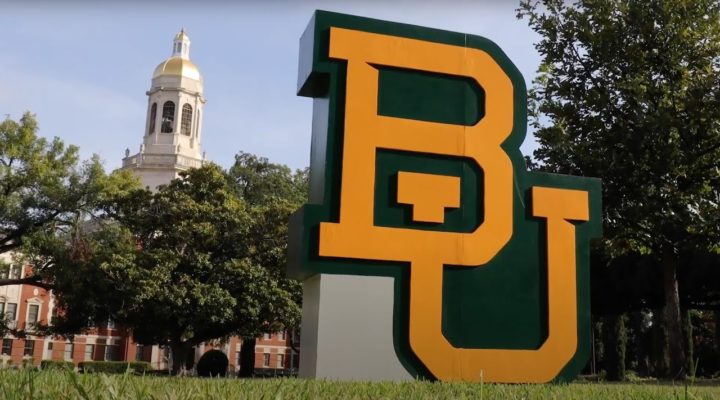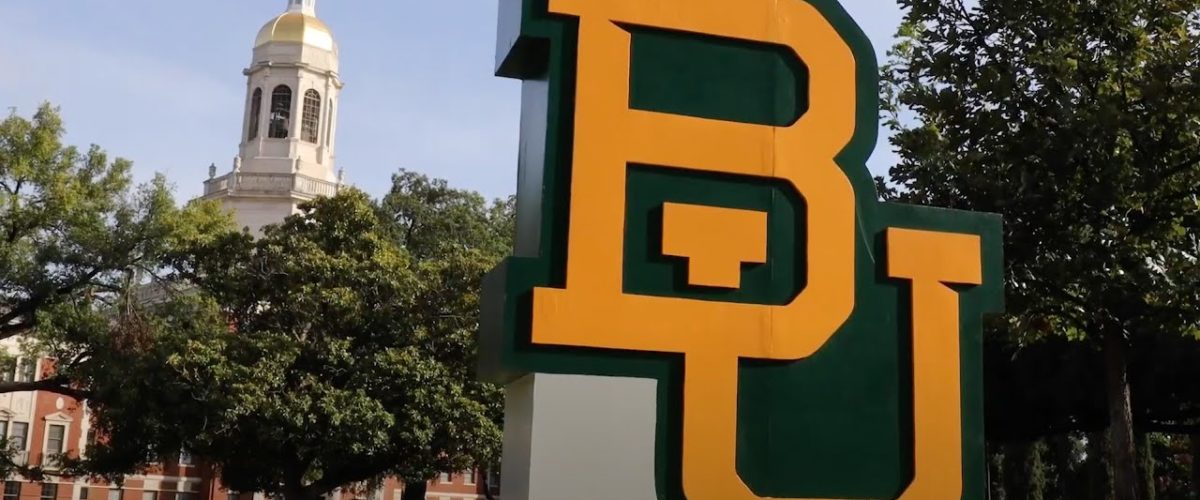As news of Baylor University’s “possible” sanction of a campus group for LGBTQ students spread across the nation, the Texas Baptist school continued to be criticized from both sides of the debate.
The high-profile critique of the Waco, Texas, school played out at the same time an older sex-related drama was unfolding in a Houston courtroom.
On Thursday, May 20, in the 234th Civil Court of Harris County before Judge Lauren Reeder, attorneys presented opening statements in a case brought by a former Baylor student who said she was sexually assaulted in her dorm room by former Baylor football players in 2017. The woman has sued the university and the former players, claiming the university failed to protect her and had failed to address a history of sexual assaults on campus.
The high-profile critique of the Waco, Texas, school played out at the same time an older sex-related drama was unfolding in a Houston courtroom.
The scandal that ensued from this and related charges of sexual assault by football players led to the ouster of Baylor football coach Art Briles and ultimately Baylor University President Ken Starr. The university says it has instituted more than 100 changes in policies and procedures to address the problems.
The Houston Chronicle reported on the opening day of the trial, noting that Baylor defense attorney Tom Brown told the court the school controls the factors that it can, but sexual assault among students is “practically impossible” to prevent. “What happened that night between those four adults behind that closed door was not in any way caused by Baylor University,” he said.
That statement came just a few days after Baylor regents and administrators touted their Statement on Human Sexuality as a safeguard against possible acceptance of an official campus group for LGBTQ students. That statement emphatically addresses student sexual behavior.
A news release announcing the possibility of a new LGBTQ student group said Baylor “continues to place a priority on care for all students while rooted in its Baptist beliefs and traditional biblical understanding of human sexuality.” That means “sexual relations of any kind outside of marriage between a man and a woman are not in keeping with the teaching of Scripture.”
Mohler and now Jeffress on the attack
As previously reported by BNG, Southern Baptist Convention seminary president Al Mohler was among the first to pounce on Baylor, accusing the school of “institutional capitulation disguised as care.”
Mohler was then joined by Robert Jeffress, the outspoken pastor of First Baptist Church in Dallas, who said on the Todd Starnes Show that Baylor’s faculty is full of “infidels” who teach “anti-Christian” ideas.
Starnes is a far-right online radio host who previously wrote for Baptist Press, the denomination’s media outlet. His show’s website warns faithful listeners that they must subscribe to his daily emails because they can no longer count on social media not to censor their conservative views.

Former President Donald Trump in 2016 tweeted this photo of himself with Dallas pastor Robert Jeffress.
Jeffress, who was a member of Donald Trump’s Evangelical Executive Advisory Board and a never-failing advocate for the former president, did not appear to be equally troubled by Trump’s lewd comments and behavior and the multiple accusations against him of sexual assault.
After the Access Hollywood tape surfaced with recorded evidence of Trump making lewd comments about sexually assaulting women, Jeffress was unmoved.
“I said at that time, with Trump sitting next to me, I would not necessarily choose this man to be my child’s Sunday School teacher,” Jeffress said. “But that’s not what this election is about.”
Following Criswell’s legacy
In critiquing Baylor, Jeffress pulled out a favorite word of his legendary predecessor at First Baptist Dallas, W.A. Criswell: “Infidel.” Jeffress grew up at First Baptist under Criswell and then attended Baylor, where he earned a bachelor of science degree.
A search of the website containing all of Criswell’s sermons shows at least 80 instances of the pastor using the word “infidel” in published sermons.

W.A. Criswell with image of First Baptist Dallas behind him.
One of those occurred in 1977, when Criswell preached a sermon at the SBC Pastors’ Conference on “The Infallible Word of God.” The sermon was a broadside against modern scholarship and liberal educators. He warned that “these kids in our church go away to school, and they come back, and they say to me, ‘I’ve given up the faith. I have learned in the university that that book out of which you preach is nothing but a collocation of legends and myths and fables.’”
Similarly, Jeffress told Starnes there are professors at Baylor who try to convince young Christians to question their faith in God: “Our church has sent students down there for years who have their faith completely torn apart by infidels in the religion department.”
This tirade against Baylor was prompted by the university regents cracking open the door to the possibility of allowing a narrowly defined group of LGBTQ students to have a campus organization — something university administrators have denied for more than a decade.
Yet because of this possibility, parents should keep their kids away from Baylor, the Dallas pastor warned.
“What they teach and the underlying philosophy is anti-Christian,” Jeffress told Starnes. “And I don’t think any true Christian parent who wants their kids to have a Christian education would allow their child anywhere near Baylor University.”
“I don’t think any true Christian parent who wants their kids to have a Christian education would allow their child anywhere near Baylor University.”
He added: “Like any good magician, the Baylor administration has mastered the art of distraction and deception. … What this really is, Todd, is a fraternity for LGBTQ students. The fact is they thought a support group might give the impression that they were trying to help these students. If they were really trying to lead these students out of homosexuality and out of gender confusion, that would be a good thing. But what they’re really going to do is to affirm their right to engage in that kind of ungodly behavior.”
Although Jeffress didn’t specify any Baylor professors who are “anti-Christian,” he connected the LGBTQ news with the view of his predecessor to say the entire school should be avoided.
“Being filled with Christians doesn’t make you a Christian university,” Jeffress said. “It is your viewpoint and what you teach. I say either go to a distinctively Christian university or go to a completely secular university and get a better rate for doing it.
“At least your child will understand the battle lines and what they are instead of being confused by people who claim to be a Christian but act in a completely different way,” he concluded.
A Baylor professor responds
Robert Baird, professor of philosophy emeritus at Baylor, wrote an op-ed for the Waco Tribune-Herald challenging Jeffress.

Robert Baird
“It would be interesting to ask Jeffress to name one infidel in the whole of Baylor University, much less in the religion department,” Baird wrote. “This Jeffress assertion is reminiscent of Wisconsin Sen. Joseph McCarthy’s claims in the 1950s to have had a list of 200 members of the State Department who were Communists. The number on his list continued to drop: 70, then 50, and finally 10, but he never actually named one. So, who are the infidels in the Baylor religion department, Pastor Jeffress? He surely knows that there are none.”
The emeritus professor noted Baylor’s regents and administration were responding to the urging of the Baylor Faculty Senate, the Baylor Student Senate, key donors and “thousands of Baylor alumni” who requested that the university reconsider its anti-LGBTQ student group stance.
Baird then related his own experience as a student at Baylor after graduating from Central High School in Little Rock, Ark., in 1955.
“It would be interesting to ask Jeffress to name one infidel in the whole of Baylor University, much less in the religion department.”
“These teachers and many others at Baylor introduced me both to the world of ideas and to the responsibility of thinking critically about those ideas,” he said. “Eventually, I came to see these Baylor teachers as part of a larger and longer academic tradition going all the way back to Socrates who argued that the unexamined life isn’t worth living. Socrates viewed himself as a gadfly with a God-given task of stimulating individuals to think, to evaluate critically the principles guiding their lives. And that is what Baylor did for me: stimulating me to think seriously about matters that matter.”
At Baylor, he learned and then later taught that the mind is “a gift of God” and the disciplined development of the mind is “a moral and religious obligation.”
LGBTQ student perspectives
The kind of open-minded education Baylor aspires to deliver still eludes students who identify within the LGBTQ community, some of them have explained over the last week.
Jake Picker serves as vice president of Gamma Alpha Upsilon, the LGBTQ student group that has been denied an official campus student group charter for a decade. He is one of the defendants in a class-action lawsuit against the U.S. Department of Education that names Baylor among 25 faith-based schools that are allowed to receive government funding while discriminating against gay, lesbian and transgender students.
The Religious Exemption Accountability Project, which is coordinating the lawsuit, tweeted out Picker’s photo and a response to the Baylor regents’ news, saying Picker “has often felt unsafe and unprotected for a number of reasons – including the explicitly anti-#LGBTQ+ student policies in the school’s handbook.”
That sentiment is shared by Justin Tidwell-Davis, a 2009 religion graduate from Baylor who now lives in Seattle.
“As a queer Baylor alum, I have to say that Baylor is continuing to exploit its LGBTQ students by making this announcement to make the institution seem more loving without actually having changed anything,” he said. “Baylor is merely considering the possibility of allowing the charter of some kind of LGBTQ student group that aligns with Baylor’s policies and beliefs that LGBTQ people should be single and celibate for life, and not advocate for their own civil rights.”
“As a queer Baylor alum, I have to say that Baylor is continuing to exploit its LGBTQ students by making this announcement to make the institution seem more loving without actually having changed anything.”
He expressed particular frustration at the university’s public documentation of the regents’ action, which he said “does nothing to explain the mental health disparities that young LGBTQ people face. By only mentioning suicidality rates, and not the root causes like a lack of resources, risk of family rejection, religious rejection, lack of supportive social environments, hostile political environments, and a lack of legal protections that their peers enjoy, Baylor is again pathologizing LGBTQ students in order to pat itself on the back and call itself loving and caring.”
The university’s Statement on Human Sexuality, which was adopted during his time as a student, “filled me with a persistent state of dread and anxiety,” he said. “Would I be disciplined if I went on a date? Held another man’s hand? Shared a kiss? What if someone reported me for doing so off campus or out of town? Would I be expelled? How would I explain that to my parents? Would I be disowned? All these were very real fears that I carried while I was a student.”
In response to these fears, he submitted to counseling through a Texas Baptist church that amounted to the now-discredited conversion therapy, claiming to “cure” gay and lesbian people of their sexual orientation.
“I was there in 2002 and 2007 when a Baylor professor scrubbed a message of support for LGBTQ students, simple as ‘God loves you’ with a rainbow off the sidewalk with his foot. I was there when Baylor power-washed these messages from the sidewalk. The message I internalized: ‘We will erase you.’”
Tidwell-Davis cited multiple other examples of students he knew who were disciplined because of their sexual orientation.
“Since graduating in 2009 and coming out in 2011, I’ve connected with former Baylor students who have shared their stories of being harassed and mistreated by other students, by their professors in the classroom, or at church,” he said. “Being subjected to exorcisms by other students, shunned, told they were mentally ill or demonically possessed for being LGBTQ, friends who didn’t report sexual harassment and assault because they feared that they would be punished for having been assaulted by someone of the same-sex.”
And like Jeffress — but from the opposite viewpoint — Tidwell-Davis worries about what students are learning at Baylor. “I feel sadness, anger and pain that Baylor is shaping generations of students who are going out into the world with the belief that discrimination against LGBTQ people is a Christian imperative and a right.”
Related articles:
Baylor walks the line on LGBTQ student group as critics pounce from the right
25 faith-based schools named in LGBTQ discrimination case against Department of Education
Baptist schools seek waiver from LBGT discrimination ban
LGBTQ-friendly student group, alumni vow to fight for inclusion at Baylor
Robert Jeffress: Trump’s alleged affair with porn star ‘totally irrelevant’ to his evangelical base


